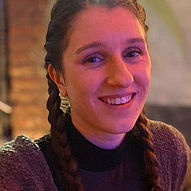Selina Meyer studied English and information science at the University of Regensburg. Afterwards she studied information science, also at the University of Regensburg. The topic of her master’s thesis was: “2 kilos away in just 24 hours” – quality analysis of german-language weight loss information on the internet.
In addition to the master’s degree, Selina Meyer is already working as a research assistant at the Chair for Information Science at the University of Regensburg. She has been working there as a research assistant since March 2020. The focus of their events is on information science and digital humanities. In her exercises, she focuses on practical application of the theoretical contetn from the associated lectures.

Chair of Information Science
At the Chair for information science.
My events are in information science and digital humanities. So far I have only been doing exercises, so my teaching focuses on the practical application of theoretical content from the lectures.
In the tutorial on the basics and application of machine learning methods, the focus is on programming with Python, Pandas, Nymph and Scikit – learn – tools that are of great importance in the field of machine learning.
Lectures often focus on mathematical foundations and formulas. However, the exercises can convey what is possible in practice and how knowledge from the lecture can help solve real problems. Especially with different prior knowledge, I am happy for every question that is asked. The more communication comes from the students, the more I can repond to the individual.
I think one of the main competences that you learn in the course is to work independently and in new subject areas and techniques. The imparted basic knowledge is particularly useful for this, but also the numerous practical exercises and projects, which often require a lot of self-study to develop this competence.
AI is an extremely exciting field and is developing rapidly. It can also be used in almost any context and offers added value in almost all subject areas. It is hard to imagine what will be possible in this regard in the future.
I am still at the very beginning of my research. In my master thesis, I dealt with the quality of information for losing weight on the Internet. Now I want to work out ways to support obesity therapy automatically by providing high-quality information, but also by an empathetic “virtual coach” who motivates and faciliates certain aspects of losing weight.
The “virtual coach” should act empathically on the user and automatically apply certain therapeutic strategies. He shuld also recognize different topics and be able to react to them. Such a system naturally relies heavily on machine learning and is hardly possible without AI. However, as I said, I have only been dealing with this topic for a short time.
During my studies, I attended a few events that were related to AI. However, I am still learning every day. I have acquired part of my knowledge through specialist reading and online tutorials, for example on Kaggle.
It is by no means easy for me, because it is an extremely complex field. I often need a long time to understand complex math formulas in particular. However, thank God there are an incredible numer of tools on which to rely today.
What I find most fascinating is that we are currently only scratching the surface of what is possible and that the field is developing so unpredictably.
I think that AI could also add value in other areas, such as history or literary studies. The basic idea of digital humanities is to build a bridge between the humanities and technical courses. Perhaps this will leas to the fact that in the future traditionalle more “non-technical” courses can slo benefit from technical progress.
I always find multidisciplinary initiatives great, since each subject can benefit from different perspectives. So far, however, I have had very little contact with the project.
I can’t think of anything traigt away. The questions were very productive 🙂
Ms. Meyer, thank you for taking the time to answer these questions. We wish you a nice day!